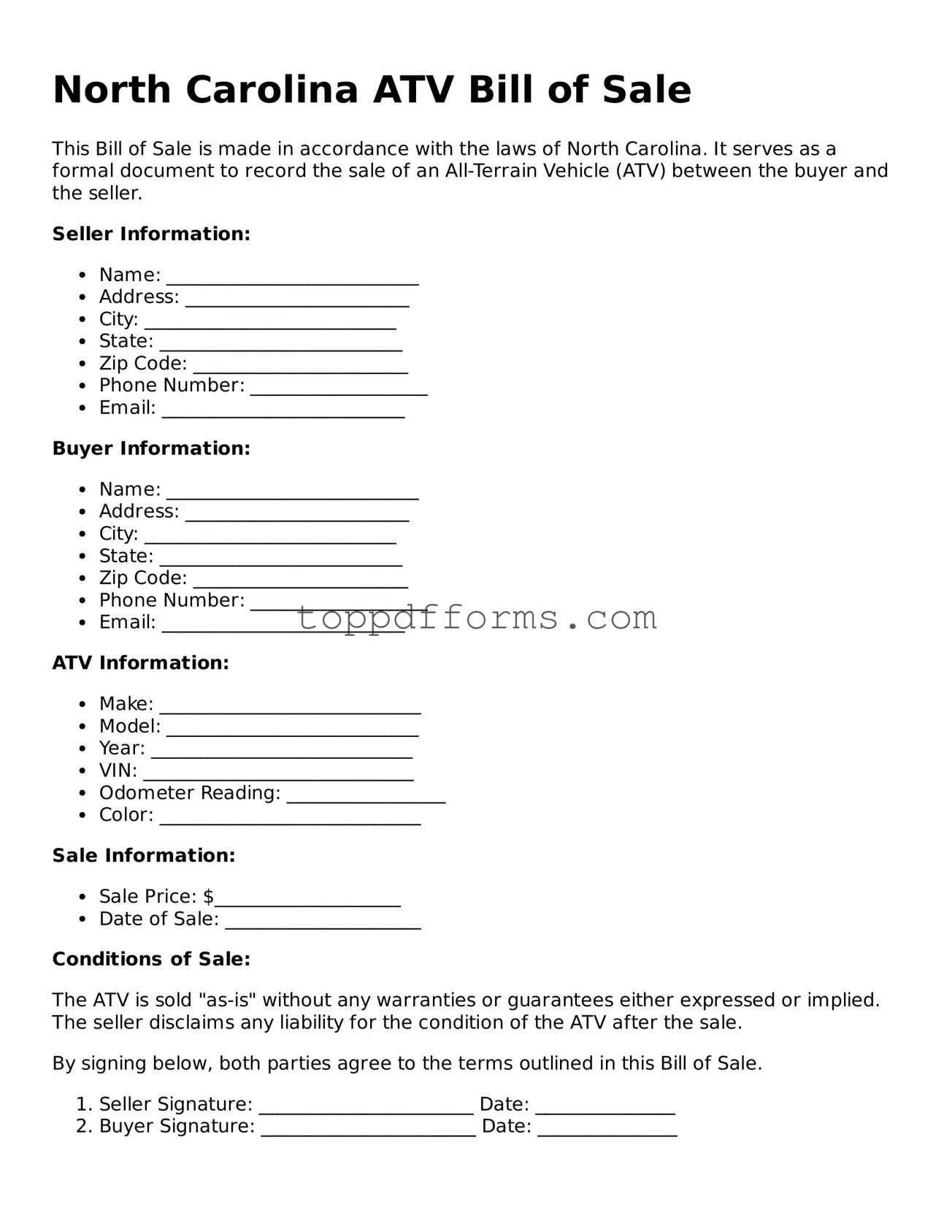ATV Bill of Sale Document for North Carolina State
Things You Should Know About This Form
What is an ATV Bill of Sale in North Carolina?
An ATV Bill of Sale is a legal document that serves as proof of the sale and transfer of ownership of an all-terrain vehicle (ATV) in North Carolina. This form includes important details about the buyer, seller, and the ATV itself, such as the vehicle identification number (VIN), make, model, year, and sale price. Having this document is crucial for both parties involved in the transaction, as it helps to clarify the terms of the sale and provides a record for future reference.
Is an ATV Bill of Sale required in North Carolina?
What information should be included in the ATV Bill of Sale?
An effective ATV Bill of Sale should include several key pieces of information. This includes the full names and addresses of both the buyer and seller, the date of the transaction, a description of the ATV (including the make, model, year, color, and VIN), the sale price, and any conditions of the sale. Both parties should sign and date the document to validate the transaction.
How can I obtain an ATV Bill of Sale form?
Do I need to have the ATV Bill of Sale notarized?
What should I do after completing the ATV Bill of Sale?
Can I use an ATV Bill of Sale from another state?
PDF Overview
| Fact Name | Description |
|---|---|
| Purpose | The North Carolina ATV Bill of Sale form is used to document the sale or transfer of ownership of an all-terrain vehicle (ATV). |
| Governing Law | This form is governed by North Carolina General Statutes, specifically under Chapter 20, which covers motor vehicles. |
| Information Required | Key details such as the buyer's and seller's names, addresses, and signatures are required to validate the transaction. |
| Vehicle Details | The form must include specific information about the ATV, including the make, model, year, and Vehicle Identification Number (VIN). |
| Consideration | The sale price or consideration for the ATV must be clearly stated to establish the terms of the sale. |
| Notarization | While notarization is not mandatory, it is recommended to enhance the document's legal standing and authenticity. |
| Record Keeping | Both the buyer and seller should keep a copy of the completed Bill of Sale for their records, as it serves as proof of the transaction. |
Common mistakes
Filling out the North Carolina ATV Bill of Sale form can seem straightforward, but many people make common mistakes that can lead to complications. One frequent error is failing to provide accurate information about the ATV. This includes details such as the Vehicle Identification Number (VIN), make, model, and year. Inaccurate information can create problems during registration or when transferring ownership.
Another mistake is not including the purchase price. The Bill of Sale must clearly state the amount paid for the ATV. Omitting this detail can raise questions about the transaction and might complicate tax assessments. Sellers and buyers should ensure that the price is clearly noted to avoid any misunderstandings.
Many individuals also overlook the need for both parties' signatures. The Bill of Sale is a legal document that requires the signatures of both the seller and the buyer. Without these signatures, the document may not be considered valid. This can lead to disputes or difficulties in proving ownership in the future.
Some people fail to date the Bill of Sale. Including the date of the transaction is crucial. It serves as a record of when the sale took place, which can be important for both parties, especially in the event of disputes or if the buyer needs to register the ATV.
Additionally, not keeping a copy of the completed Bill of Sale is a common oversight. After signing, both parties should retain a copy for their records. This document serves as proof of the transaction and can be necessary for future reference, such as for insurance purposes or if any issues arise.
Finally, misunderstanding the requirements for notarization can lead to problems. While North Carolina does not require the Bill of Sale to be notarized, some buyers or sellers may think it is necessary. It's important to clarify this requirement to avoid unnecessary steps and ensure a smooth transaction.
Other Common State-specific ATV Bill of Sale Forms
Bill of Salw - Essential for registering or titling the ATV under new ownership.
When engaging in a vehicle sale, it's important for both buyers and sellers to utilize the proper documentation to avoid potential issues. One essential document is the Texas Vehicle Purchase Agreement form, which provides a clear outline of the sale's terms and conditions. To facilitate this process and ensure you have the necessary paperwork, consider accessing the required forms through PDF Templates, ensuring all details are accurately captured for a seamless transaction.
Printable Atv Bill of Sale - Aids in ensuring compliance with state regulations.
